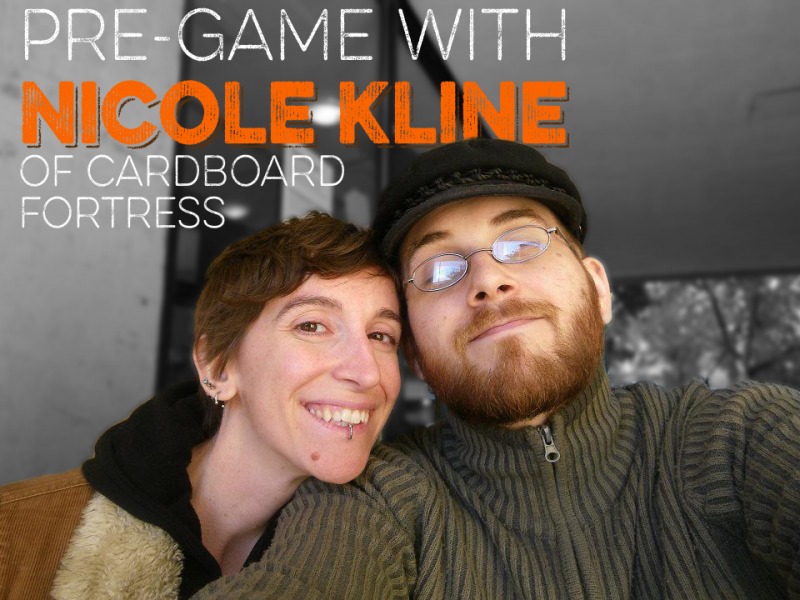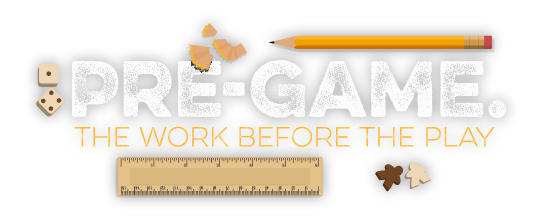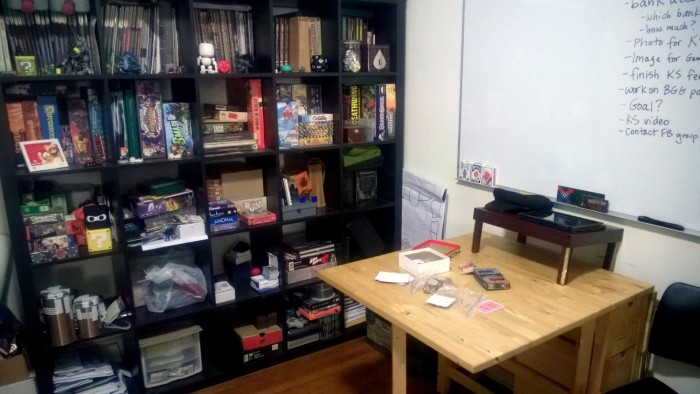
Tell us about yourself – Who are you? What do you do?
My name is Nicole Kline, and I am an independent game designer with my partner, Anthony Amato. Our company is Cardboard Fortress Games. We both have day jobs, and I am currently in grad school for Library and Information Sciences. We keep ourselves busy!
This post has affiliate links, which directly support Andhegames.com at no extra cost to you. If you have any questions about anything recommended, let me know. – Andrew
If I’ve never played your games before, what’s the first one I should try?
You should definitely start with RESISTOR_, which is our game coming to Kickstarter soon! It’s a two-player card game where you play as two supercomputers in charge of your country’s global thermonuclear warheads. It can get intense.
(I Suggest you go right now and sign up for their mailing list, so you get notified when this hits Kickstarter! –A)
One fact that we probably don’t know about you:
Some of my friends watch that reality show The Bachelor and invited me to watch it with them. What I thought was going to be a grueling experience ended up being fun – we turned it into a game. We call it Fantasy Bachelorball! We each pick different contestants and get points based on what they do that week.
As for Anthony… he’s a man of mystery. Even I don’t know everything about him!
What tabletop games (including digital board/card games) are you playing most right now?
We play a lot of video games. We are both really into Ascension on iOS. We’ve also been trying to finish off Lara Croft: The Guardian of Light so we can play the new one. On the tabletop, we’ve been been playing a lot of Star Realms, and whenever we go to game night, we find ourselves playing King’s Forge. I just got Dying Light, so who knows when I’ll surface from that. Oh, and we play a lot of Dungeons & Dragons. Anthony is always trying to revive our Blood Bowl League as well.
What are your all-time favorite tabletop games?
Anthony’s favorites are Battlefleet Gothic, Blood Bowl, King of Tokyo, Pandemic, and Robo Rally. I overlap only with Pandemic – my other favorites are Lords of Waterdeep, Quarriors, and Super Dungeon Explore.
What are you naturally good at that helps you in your work?
Anthony creates all the art and I do all the writing. They’re really important aspects of designing a game, and it helps to have each other.
What are you not naturally good at, that you’ve learned to do well anyway?
I’m terrible at taking criticism with my writing. So the first time we sat down to write instructions, it involved a lot of breaks. I still get sore about it but I’m trying to improve! Anthony’s been teaching himself all kinds of digital art tricks which has been wonderful to watch.
We’re both trying to be adaptable and work within the constraints of board game design. We’re learning a lot together!
Describe your process (or lack thereof) when making games. How do you reach your final product?
Game inspiration can come from many places. For example, our game RESISTOR_ came from a game jam about using a song title – from an Oasis song, specifically. Game jams are a good place to get started. From there, we playtested a lot, then created the theme and art. We wrote the rules last only to find out that it was the hardest part. Going forward, I think we will try to take the writing of the rules into heavier consideration earlier in the process.
What design-related media do you consume on a regular basis?
I’ve been trying to navigate Board Game Geek, and I’ve read almost the entire Stonemaier Games website. OK, not really the whole thing, but almost everything related to Kickstarter. I’m a big fan of James Mathe as well. We also listen to the Dice Hate Me podcast, along with a few others. Anthony likes to frequent the chatroom at The Game Crafter as a sounding board for advice and to talk shop.
What are some tool/programs/supplies that you wouldn’t work without?
Since we’ve started working on board games, I find myself constantly wanting to draw my ideas out by hand. So I’ve been using pencils and scrap paper much more. We’ve made several prototypes of games with items around the house, and ended up buying playing cards and poker chips as extra pieces. So I guess just random items we can use as game boards, and anything to draw with.
Anthony does all of his artwork digitally using what he calls “lots of dirty tricks,” and he bought a Surface Pro 2 last year to try drawing with a tablet. (Drawing with a tablet is the best. Really, the best. –A)
Oh, and I’d be remiss if I didn’t say we really, REALLY depend on our local copy center. We get a lot of last-minute stuff done there.
What’s your playtesting philosophy? How often/early do you playtest?
Our philosophy with playtesting is just that: do it early and do it often! Though most of the time, it’s more of a “how can we trick someone into playing this” scenario. Every Thursday night, we go to Dev Night at the Philly Game Forge, where all the developers in the city go and hang out and play games. On Tuesday nights, there’s a board game night at our local board game store. Those are the two places we bring games the most. But we also bring them to all kinds of events, especially those run by the UnPub Network. And, of course, we invite people to our apartment, and our friends are usually up for some playtesting after Dungeons & Dragons – especially our buddies over at Nerdarchy.
What are some of the biggest obstacles you’ve faced in your work, and how have you overcome them?
Our biggest obstacle is just our lack of time. We both work full time, and until we can break through into the industry and really start making a living off of it, we need to stay at those jobs. The hope is that we can at least get successful enough that one of us can quit our full time job, which could help us get games out more quickly.
How do you handle life/family/work balance?
It’s really hard! We have jobs that run from 8:30-5, I have online grad school, I have a few new babies in my family who I want to see grow up, my sister is getting married this year… Sometimes I just don’t sleep, but I end up crashing when that happens. I don’t like to ever miss anything! The most important way to handle the balance, I’ve found, is to learn when to say no. I’m still learning that one…
Do you have a second job? If so, what do you do? If not, when/how did you quit your day job?
Yes, Anthony and I both work at local universities full time. But I can’t wait until the day I can consider that my “second job!”
How many hours/week do you generally devote to game design? How many to other business-related activities?
Anthony devotes somewhere between 30-40 hours a week on game design and artwork. I devote about 20 hours a week, and most of that has been all business lately. I’ve been trying to figure out our taxes, as I mentioned, and contacting our lawyer about setting up our business, and working on our Kickstarter feedback… I’m really looking forward to getting back to the fun stuff!
What one piece of advice would you give aspiring game designers?
Get a solid group of people to play, playtest, and discuss games with. If you have a community you can depend on, even just to play games, it will be invaluable. Don’t be afraid to reach out to the pros for advice because everyone in the boardgame community is super nice. Also, start small. Make a good but small game and try selling it on The Game Crafter first.
What’s the best advice about life that you’ve ever received?
That’s a tough one. I’m just going to go with “You can’t please everyone.”
Who would you like to see answer these questions?
Mila Pokorny of DeerFox Games! She’s making an amazing card game called Mahou Shojo and everyone needs to know about it.
(Here’s the interview with Mila!)




